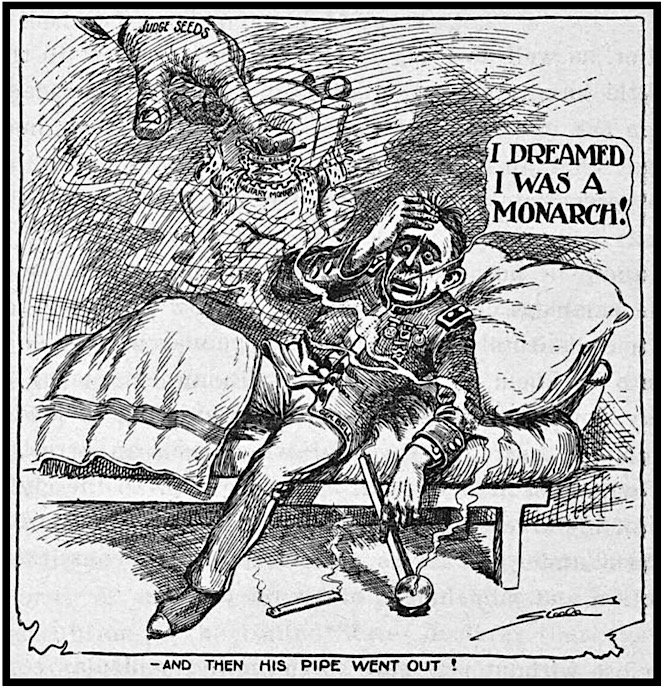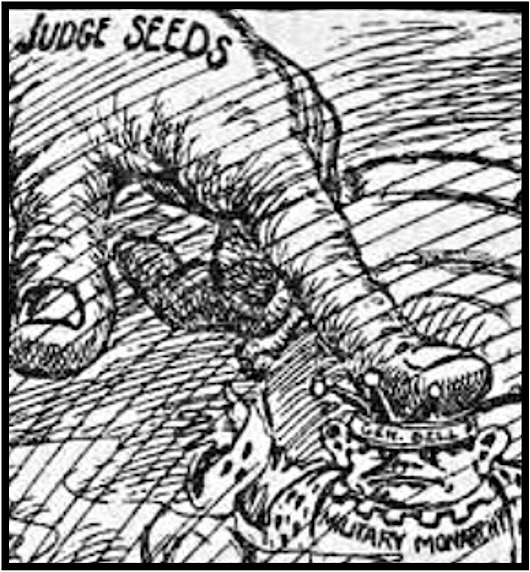 —————
—————
Hellraisers Journal – Thursday October 1, 1903
Cripple Creek, Colorado – Judge Seeds Defends Constitutional Government
Cartoon by A. W. Steele of the The Denver Post:
Report of Emma F. Langdon of Victor, Colorado:
Judge Seeds Thursday morning (September 24) notified General Chase to be present in court with his prisoners [Parker, Campbell, Lafferty, McKinney] before 2 o’clock in the afternoon, as promptly at that hour he would render a decision in the habeas corpus case. Chase stated that whatever the decision of the court might be, he would certainly bring the prisoners back to Camp Goldfield unless otherwise ordered by the governor of Colorado. At 1:30 the military appeared with the same old pomp, minus the gatling gun. (Formerly of Wyoming.)
After patiently listening for several hours, Judge Seeds ordered the prisoners released and handed over to the civil authorities, and gave reasons for his decision in a long and carefully compiled argument from which I quote a few:
[Judge Seeds Speaks:]
If the court shall err in its conclusions, it will be no fault of the able counsel who appear for and against the prisoner. Extraordinary industry has been displayed by counsel in the production of authorities, and the questions involved have been discussed with unusual ardor, eloquence and logic. As the result of counsel’s labors, and the great attention and consideration the court has given to their arguments and authorities, it feels clear in its conclusions, and can announce them without any misgiving.
The importance of the questions cannot be over estimated. They embrace not only the power and authority of the commander of the military forces of the state over the freedom of the citizens in times of local disturbances that may more or less imperil life and property, but also the very fundamental principles of American liberty…..
For the reason that the governor recites in the order, he directs the brigadier general commanding the National guard to forthwith order out the troops, etc., specified, to properly enforce the constitution and laws of the state, and to prevent the threatened insurrection and to protect all persons and property in said county from unlawful interference, and to see that threats, intimidations, assaults and all acts of violence cease and that public peace and order be preserved. I take it that what all these commands mean is that the brigadier general should, with the National guard, support and enforce the laws within the prescribed district. That the case presented by the petition required that the habeas corpus should issue as prayed admits of no question. The question is, does the executive order, admitting all that it recites as the basis for it, to be true, and that General Chase arrested and detained the prisoners by virtue of that order, constitute a justification of the act……
The threatened insurrection referred to in the order was in connection with a strike in the Cripple Creek district by the metaliferous miners. It is not denied that they quit work peacefully; but it was feared by some and claimed by others that in the course of the strike persons would be injured and property destroyed and that the insurrection was threatened by an organization known as the Western Federation of Miners to which the striking miners belonged. Whether the fear was well or ill founded it is not for the court to say. It will accept the statement in the executive order as the truth. It feels bound to do so from the respect which one of the co-ordinate branches of the state government should always entertain for the other two…..
I take it to be fundamental that, except a state of war exists, a state in which all civil authority is overthrown, what is known as “martial law” cannot exist or be declared under our state constitution…..
Anderson’s law dictionary defines martial law to be “the law of military necessity in the actual presence of war, administered by the general of the army; it is arbitrary; it is the will of the general who commands the army; it supercedes all existing civil law; the commander is the legislator, judge and executioner; there may or may not be a hearing upon charges, at the will of the commander; it is built upon no settled principles, but entirely arbitrary in its decisions. In reality it is no law, but something indulged rather than allowed as law.” This definition is fully sustained by a multitude of authorities, and none conflict with it……
Then if the civil power must prevail, except, possibly, in the extreme case of actual war, and for self-preservation, can the right to the writ of habeas corpus be impaired and can a citizen be deprived of his liberty for an indefinite period of time by the will of a military commander exercised under the authority of such an executive order as respondent’s return sets forth? The constitution of the United States declares that “the privilege of the writ of habeas corpus shall not be suspended unless when in case of REBELLION OR INVASION the public safety may require it.” This is, in effect, the same as the habeas corpus provision of the Colorado constitution.
This writ is the remedy which the law gives for the enforcement of the civil right of personal liberty, and any other person whomsoever, upon any pretense whatsoever, has a right to have this writ issued by a court commanding the person holding him in custody to bring him before the court for inquiry as to the cause and legality of his imprisonment, and if illegally restrained of his liberty, the prisoner is entitled to his discharge…..
Were this court to admit that civil power is overthrown in Teller county it would be in conflict with its unaffected consciousness to the contrary. Its courts are open; its decrees are respected; its officials are capable, earnest and law-abiding persons, and no evidence has been brought to the court’s attention that the violators of the law will not be proceeded against with vigor and promptness.
Though there were evidence of some indifference or neglect in the performance of duties by some of the officers of this court, that would be no proof that civil power within the county was overthrown. Were it so, civil power would be overthrown in too many states and counties of the country. The constitution of Colorado declares “that the military shall always be in strict subordination to the civil power.” Not sometimes, but “always.” There could be no plainer statement that the military should never be permitted to rise superior to the civil power within the limits of Colorado……
The soldier, as well as every other citizen, is subject to the law of the land. The militia have no other or different powers than peace officers by law have under the same circumstances, except that they may act as an organized body. That an act was done by military order or by order of a governor is no defense unless the order itself be one conformable to law…..
I cannot and will not subscribe to such a doctrine. For me to do so would make me particeps criminis in the overthrow of a free government in Colorado, and to substitute for it an absolute monarchy. I do not say that when called into the field by the governor in an emergency, the military commander may not arrest those who are participating in lawlessness he is directed to suppress; but I do say that when such an arrest is made the prisoner must, with reasonable speed, be turned over to the civil authorities, with the cause of his arrest made known, that the civil authorities may proceed against them under the forms prescribed by the constitution and laws for the prosecution and punishment of his offense…..
I cannot close without reference to the military display committed with the hearing of this case. It was offensive to the court, and in its opinion, unwarranted and unnecessary; nevertheless, I tolerated it because it was by the National guard, and if I had insisted upon its withdrawal, a conflict would have probably arisen with the entire National guard of the state upon one side and a mere posse commitatus upon the other. The hearing of the case would have been necessarily indefinitely delayed, a great wrong to the prisoner and a denial of the justice to which he was entitled.
I trust that there will never again be such unseemly and unnecessary intrusion of armed soldiers in the halls and about the entrances of an American court of justice. They are intrusions that can only tend to bring courts into contempt and make doubtful the possession of that liberty that is the keystone of American governments. It follows from what I have said that, in the opinion of the court, upon the facts stated in said petition and the return of the respondent, the return ought to be squashed, and that the said Parker ought to be discharged from custody as in said petition prayed, and it is so ordered.
The cases of James Lafferty, C. H. McKinney and Charles Campbell, relators, vs. the same respondents, by stipulation stand decided as the case of Parker and the said James Lafferty, C. H. McKinney and Charles Campbell are ordered to be discharged from custody as in their respective petitions prayed.
WILLIAM P. SEEDS, JUDGE.
—————
[General Chase Defiant, Yet Releases Prisoners.]
Judge Seeds’ decision was read to a crowded court room. Immediately after the decision was finished Chase arose and notified the court that he would not abide by the order of the court and facing his soldiers, he commanded them to take the prisoners. Later in the evening, however, about 8 o’clock the military authorities released Sherman Parker, “Slim’’ Campbell, James Lafferty and C. H. McKinney from the “bull pen.” No explanation was given. The men went straight to their homes and did not even tarry at union headquarters. This news came as a startling surprise to everybody, since just a few hours before the officers had defied the order of the court and refused to release them. The supposition is that this was done in compliance to a telegram from Governor Peabody instructing Chase to comply with the order of the court.
Mrs. Sherman Parker, who sat by her husband during the reading of the decision, screamed and grasping her husband, fainted. The soldiers immediately grabbed Parker and pulled him away from his wife and created one of the most heartrending scenes ever witnessed in a Teller county court room. Mrs. Parker was in a dead faint for twenty minutes, and her husband begged to be permitted to remain by his wife, whom he declared to be dying but was refused by Chase, who also, it is claimed, refused her medical assistance, laughingly claiming that she was all right and would soon recover.
Senator Patterson was near and admonished the soldiers to leave the man with his wife until she could recover, which a lieutenant in charge of the prisoner finally agreed to do. The court room was then cleared and Mrs Parker finally recovered and her husband was taken back to the bull pen. Tears came to the eyes of many who witnessed the scene, and it was with difficulty that order was restored, which was accomplished by the suggestions of Mr. Patterson.
[Emphasis added.]
~~~~~~~~~~~~~~~~~~~~~~~~~
SOURCES & IMAGES
Quote Mother Jones, Powers of Privilege ed, Ab Chp III
https://www.iww.org/history/library/MotherJones/autobiography/3
The Cripple Creek Strike, 1903-1904
-by Emma F. Langdon
Victor, CO, 1904
-p132-137
https://archive.org/details/cripplecreekstri00lang/mode/1up?view=theater
https://archive.org/details/cripplecreekstri00lang/page/132/mode/1up?view=theater
Cartoon by Steele, Judge Seeds v Bell’s Military Monarchy, EFL p136, 1904
https://archive.org/details/cripplecreekstri00lang/page/136/mode/1up?view=theater
See also:
Hellraisers Journal: Emma F. Langdon Reports on
the Military Seizure of the Town of Cripple Creek by General Sherman Bell
Albert Wilbur Steele (1862-1925)
https://en.wikipedia.org/wiki/A._W._Steele
https://coloradoencyclopedia.org/article/wilbur-steele
https://archive.org/details/cripplecreekstri00lang/page/248/mode/1up?view=theater
Tag: Emma F Langdon
https://weneverforget.org/tag/emma-f-langdon/
Tag: Cripple Creek Strike of 1903-1904
https://weneverforget.org/tag/cripple-creek-strike-of-1903-1904/
~~~~~~~~~~~~~~~~~~~~~~~~~
Unions and the Law – Street Dogs


